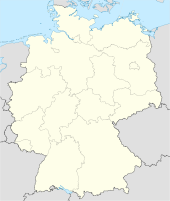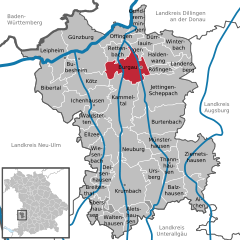- Burgau
-
Burgau 
Coordinates 48°25′56″N 10°24′25″E / 48.43222°N 10.40694°ECoordinates: 48°25′56″N 10°24′25″E / 48.43222°N 10.40694°E Administration Country Germany State Bavaria Admin. region Swabia District Günzburg Mayor Konrad Barm (FW) Basic statistics Area 25.92 km2 (10.01 sq mi) Elevation 462 m (1516 ft) Population 9,290 (31 December 2010)[1] - Density 358 /km2 (928 /sq mi) Other information Time zone CET/CEST (UTC+1/+2) Licence plate GZ Postal code 89331 Area code 08222 Website www.burgau.de (Lordship) Margraviate of Burgau
(Herrschaft) Markgrafschaft BurgauState of the Holy Roman Empire ← 
before 1147–1805  →
→Coat of arms
Capital Burgau Government Principality Historical era Middle Ages - Lordship first mentioned 1147 - Raised to margraviate 1212 - Margravial line extinct,
to Habsburg Austria
1301- Ceded to Bavaria 26 December 1805 1805 Burgau is a town in the district of Günzburg in Swabia, Bavaria. Burgau lies on the river Mindel, and has a population of just under 10,000.
Contents
History
The territory around Burgau was originally part of the stem duchy of Swabia. The death of Conradin and the resulting extinction of the Hohenstaufen line in 1268 led to collapse of the integrity of the duchy and its division into reichsfrei lands, after local nobles resisted Emperor Rudolph of Habsburg's attempts to annex the duchy. The Lords of Burgau are first found in documentary mention in 1147, as Herren von Burguo. Burgau was raised to a margraviate in 1212.
With the death of margrave Henry III in 1301, the margravial line fell extinct and the Empire claimed the fief. Albert I of Germany transferred the feudal rights to his two sons, acquiring the territory for the Habsburgs, with Henry III's widow purchasing the allodial rights. Four different titles were awarded: that of allodial rights, Imperial feudal rights (German: Reichslehen), manorial rights (German: Grundherrschaft) and guardianship (German: Vogtei, usually translated as a bailiwick when used as a title).
The location of the castle produced latent tensions with the Bavarian Wittelsbachs, who coveted the margraviate to round off their territories. Their attempted purchase of the territory in 1418 was resisted by the Imperial Cities of Augsburg and Ulm, with the support of other Swabian Cities. Burgau came to rely on the support of the Imperial Cities, along with the Bishopric of Augsburg and the Fugger lands to stem the Wittelsbach's acquisitive desires, particularly after they won the land west of the Lech; see Swabian League.
Throughout the 14th century, the Habsburgs were compelled to mortgage the marquisate or its parts; the last such mortgage being to the Bishopric, ending in 1559. Further Austria fell to Emperor Ferdinand I in 1522, passing to his second son Ferdinand II, Archduke of Austria, on his death.
In the German Peasants' War in 1525, Burgau supported the Leipheimer Haufen against Ulm, but were defeated by the Swabian League. The city suffered badly under both the Thirty Years' War and the War of the Spanish succession.
Ferdinand II's successor, his nephew Emperor Rudolph II, entrusted the margraviate to Charles of Burgau, Ferdinand II's second son by his morganatic wife Philippine Welser, daughter of an Augsburg burgher. Charles was the last holder of the marquisate, from 1609–18; on his death, the land returned to the senior Austrian Habsburg line. When that archducal line expired, with the death of Sigismund Francis, the Viennese court gained responsibility for the marquisate.
In 1805, by the Peace of Pressburg, Napoléon forced a defeated Emperor Francis II to cede Further Austria to French allies on his abdication and the dissolution of the Holy Roman Empire, with Burgau passing to the kingdom of Bavaria.
In September 1853, the Ulm–Augsburg railway was built as part of the Bavarian Maximilian's Railway (Bayerische Maximiliansbahn) through Burgau, with the station officially opening on 1 May 1854. Bavarian administrative reforms in 1862 established a court, a notary and a tax office; the following year, a large fire resulted in the creation of a volunteer fire service.
Towards the end of World War II, two subcamps of Dachau concentration camp — one for men, one for women — were established in Burgau. More than 1000 prisoners, including 500 Jewish women and girls from Poland and Hungary, were transported form Dachau, Bergen-Belsen and Ravensbrück. They forced to work in miserable conditions in an aircraft hangar in Scheppach Forest; 18 died and were buried in the Jewish cemetery in Ichenhausen.[2] After the war, some 1600 Heimatvertriebene were resettled in Burgau.
Bavarian regional reforms in 1978 merged the previously-independent municipalities of Oberknöringen, Unterknöringen, Großanhausen, Kleinanhausen and Limbach into Burgau.
Politics
The city council has 20 members, currently distributed as below. Since 2002, the mayor has been Konrad Barm (Free Voters)
Sitzverteilung bei der Kommunalwahl 2002 2008 United Free Voters 7 5 Christian Social Union 6 5 Christian Voters' Community 3 3 Social Democratic Party 3 3 Free Democratic Party and Free Bürger 1 2 Active Bürger of Burgau – 2 Burgau also has two partnerships with other towns:

 Burgau, Styria, Austria — officially twinned since 1982, but informal partnerships for a decade before that.
Burgau, Styria, Austria — officially twinned since 1982, but informal partnerships for a decade before that.
 Knöringen, North Rhine-Westphalia, Germany — informal partnerships, particularly with the municipalities of Ober- and Unterknöringen.
Knöringen, North Rhine-Westphalia, Germany — informal partnerships, particularly with the municipalities of Ober- and Unterknöringen.
Attractions and culture
Attractions in Burgau include:
- the only remaining town gate, the Blockhausturm, built in 1614
- a fountain in honour of the Blessed Virgin Mary with a figure designed by Franz Schäfferle in 1696 designed, 1731
- the chapel of St Leonard, built in 1667 with a Baroque façade
- the town parish church, built between 1788 and 1791
- the castle, high above the Mindeltal
- the former Capuchin monastery. In its apse there was Leonardo da Vinci's Madonna of the Carnation, now in Munich's Alte Pinakothek
- the oldest domestic house in Burgau, which dates from the Thirty Years' War
In 1997, the city celebrated the 850-year anniversary of its first documentary mention in a complex Historischen Fest. In a slightly reduced form, further festivities were celebrated in 2001 and 2005 for the 700th anniversary of joining Further Austria and the 200th anniversary of joining Bavaria, respectively. The next Historic Festival is scheduled for July 2009.
Since the Thirty Years' War, there had been an annual custom of the Kinderbrotspeisung (literally: feeding children bread); this custom was revived by Albert Vogele in the 1950s. Now on Rosenmontag, disguised as a town soldier, his son Drummer Albert leads the children out of their schools and through the streets with his drum. The children call out traditional carnival sayings in front of the shops, demanding the shopkeepers distribute presents. This is the start of a day-long street carnival, which attracts thousands of spectators annually.
See also
References
- This article incorporates text translated from the articles Burgau and Markgraftschaft Burgau from the German Wikipedia, retrieved on 9 May 2009
- ^ "Fortschreibung des Bevölkerungsstandes" (in German). Bayerisches Landesamt für Statistik und Datenverarbeitung. 31 December 2010. https://www.statistikdaten.bayern.de/genesis/online?language=de&sequenz=tabelleErgebnis&selectionname=12411-009r&sachmerkmal=QUASTI&sachschluessel=SQUART04&startjahr=2010&endjahr=2010.
- ^ Gedenkstätten für die Opfer des Nationalsozialismus. Eine Dokumentation, Band 1. Bundeszentrale für politische Bildung, Bonn 1995, ISBN 3-89331-208-0, S. 149
External links
Aichen | Aletshausen | Balzhausen | Bibertal | Breitenthal | Bubesheim | Burgau | Burtenbach | Deisenhausen | Dürrlauingen | Ebershausen | Ellzee | Gundremmingen | Günzburg | Haldenwang | Ichenhausen | Jettingen-Scheppach | Kammeltal | Kötz | Krumbach | Landensberg | Leipheim | Münsterhausen | Neuburg an der Kammel | Offingen | Rettenbach | Röfingen | Thannhausen | Ursberg | Waldstetten | Waltenhausen | Wiesenbach | Winterbach | Ziemetshausen Categories:
Categories:- Towns in Bavaria
- Former principalities
- Former countries in Europe
- States of the Holy Roman Empire
- States and territories established in the 12th century
- States and territories disestablished in 1805
- 1805 disestablishments
- Localities in Günzburg district
Wikimedia Foundation. 2010.





